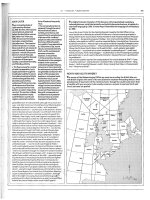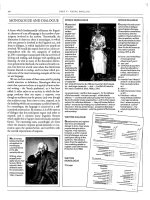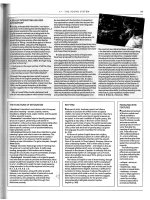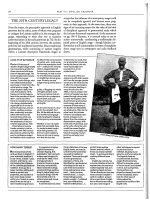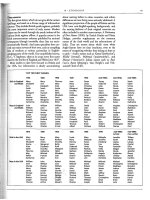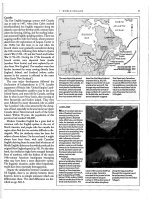SOME EXPERIENCES IN TEACHING PRONUNCIATION OF THE ENGLISH LANGUAGE TO STUDENTS AT SECONDARY LEVEL EFFECTIVELY
Bạn đang xem bản rút gọn của tài liệu. Xem và tải ngay bản đầy đủ của tài liệu tại đây (203.91 KB, 14 trang )
I. PREFACE AND AIMS AND REQUIREMENTS:
As we know, English is a very important language nowadays. What do
we learn English for? The answer is - for communication. What do students
learn English for? They learn English for the same reasons as we do. Our job
is to provide them with the basic skills they will need to practise the language
and to make sure that they have the basic knowledge and skills that they need
for future study. So, as teachers, we all want to make it easy for them to learn
the skills of pronouncing commonly-used English words.
It is not easy for most learners to master the pronunciation skills in a
short term. Both teachers and students, of course, encounter many problems
with the subject, including correct pronunciation, and we always face the
difficulty of teaching to students at differing levels of ability and skill.
After a long time teaching English at all levels at secondary school and
adult learners as well as teaching Vietnamese to English speaking people and
working as an interpreter in my part-time job, I can offer some lessons from
my experience. Some of these things you may already know. It is easy to get
caught up in ideas like, ''We do not give oral tests to students at all levels'';
''We have tried to make them fluent in using as many grammatical points and
structures as possible so that they can get good marks in their tests''.
In reality, in the reformed syllabus promulgated by Ministry of
Education students have been learning listening and speaking skills together
with reading and writing skills, but for the final examination to finish high
school to get GCSE (General Certificate of Secondary Education), students
only receive written tests. And that is why we do not pay much attention to
teaching them perfect pronunciation? My advice to you is that helping them
pronounce words correctly will help them spell correctly too. In doing this, we
will imperceptibly help them improve their listening skills that are very
important not only in everyday conversation but also in getting good marks in
the listening sections whenever they do normal tests given during the
academic terms, especially for examinations for gifted students in the English
language contests held annually. Besides our students feel confident to speak
words they are sure to pronounce in a correct way.
………………………………………………………………………………
Written by Pham Phu Dung – Tran Quy Cap Senior High School
– Hoi An Town, Quang Nam Province –
11
I had many problems in speaking English and in pronouncing English
words at first and I also had problems in teaching students correct
pronunciation. But at last I have achieved success in solving the problem - not
for all students - but for most of them. This success is particularly evident with
students who enjoy learning English and are interested in the language. The
experiences that I am presenting here are simple ones, but if you apply them to
your work, I think you will be successful in your teaching of pronunciation.
Remember that we are not native speakers. For one thing, we cannot
pronounce a word exactly the same as native English speaking people do, but
we can do our best and the hearers can understand what we are talking about.
Like singers, we need to imitate the native speakers in saying a word together
with signs of pronunciation. And remember that English is spoken with
different accents in all parts of the globe even in London people speak English
with several accents. So it is wise to choose the Queen’s English to pronounce
English words.
We can sympathize with Vietnamese students learning English as we do
with English students who are learning Vietnamese. The Vietnamese language
does not have final sounds which change the meaning of the words nine; nice;
night; knife; knight, for instance. If we do not pronounce the final sounds, the
hearers may be confused about what we are saying. And we do not have the
sound /s/ /xì/ in Vietnamese either. To give an example, the word thirsty with
the sound /s/ in the middle of the word; if we forget to pronounce /s/, then the
word will automatically change into the word thirty, and of course its meaning
will change completely. We all know that the English sounds are much like
the 6 tones in the Vietnamese language cung, cùng, củng, cụng, cúng, cũng.
These tones change the meanings of the words, and English sounds change the
meanings in the very same way. And there are many more differences in
pronunciation between the two languages.
In this document I have tried to use common words and easy-to-read
English so that everyone can understand it. Hopefully, this topic will help you,
to some extent, to solve the issues that you are dealing with. Finally, all the
constructive criticisms from my colleagues of this piece of writing will be
highly appreciated because it is not only for my sake, but also for our beloved
students, I think.
II. SOME COMMON MISTAKES IN PRONUNCIATION:
………………………………………………………………………………
Written by Pham Phu Dung – Tran Quy Cap Senior High School
– Hoi An Town, Quang Nam Province –
22
Most of our students have bad habits in pronouncing English words.
Especially, such sounds as: / ei ; t∫; ʤ; ʧ; ʒ; θ; UE; æ; ŋ; b; p; f; å:/ as in the
words: stay; away; may; play; day; cheap; bridge; decision; thread; go; bad;
sing; boy; point, fan; park, etc. They often pronounce /sịt stây/; /ờ wây/;
/mây/; /pờ-lây/; /đây/ and it must be pronounced like /ê -i/ in our language.
They confuse between the sounds /dʒ/ and /t∫/ or even never pronounce the
sound /dʒ/ at the end of the word, let us say, in the words
'college, village, large '. Students are used to omitting the sound /s/ in such
words as 'yesterday, domestic, thirsty, sister '. It makes the hearers
misunderstand what they say. Many a student cannot distinguish the sounds
between /b/; /p/ and /f/ in the words: put, book, point, ball, pause, pupil, fear,
physics and many others else. This happens even though pronunciation and
signs of pronunciation are taught in an ordered and systematic way in each
unit in the syllabus of the English language in senior high school level.
Partly, the mistakes are caused by teachers who do not focus on the
pronunciation and partly because some students do not consider it to be
important to do a good job. This is a big error for us and for them as it will
affect their future use and study of English. If they pronounce a word wrongly,
no one will understand them and they will then need to change established
habits. This is not an easy job at all. As we know, English is commonly used
nowadays. Speaking and pronouncing correctly will help us hear and
understand well what the speakers want to present to us. We can enjoy music,
listen to news from the radio, TV, and so on.
The final sounds in English are very important to tell what the word
means. Students, for instance, do not pronounce the ending sounds t, θ, k, s, E,
z; l, etc. The words wit, with, and week are pronounced differently and give
different meanings also. For instance, 'cure, kill; wine, wife; night, knife; five,
fire; book, boot'. Some students cannot pronounce the sounds/ə℧; a℧ /
appropriately, as in the words 'know, go, no, hold, cold, cow, how, about,
shout, and some mispronounce the sounds / ai /; / ú / in some such words as
smile, mile, child, result, agriculture, adult, skull, culture, brother, mother,
colour, etc .
III. HOW TO APPLY THE METHOD OF TEACHING PRONUNCIATION:
………………………………………………………………………………
Written by Pham Phu Dung – Tran Quy Cap Senior High School
– Hoi An Town, Quang Nam Province –
33
At the beginning of the school year, teachers should copy a phonetic
symbol board (Please see the attachment at the back of this document page
9,10 & 11). It is better for us to copy the source from school textbooks and
give the Vietnamese sound equivalent beside each sound. Among the sounds,
we should pay much attention to the sounds /ei/ = /ê-i/ in the words day, may,
stay, main, late; /dʒ/ = / trờ-rờ / in the words job, June, join, jealous; /ʒ/ = /rờ-
rờ/ in the words decision, vision, pleasure, occasion; /t∫/ = /chờ-rờ/ in the
words such as chair, cheap, catch, chew; /θ/ = /thờ/ in such words as thin,
thick, bath, strength; /EU/ = /ơu/ as in the words no, slow, hold, both; /æ/ = /a
- e/ as in the words hat, map, lamp, bad; /ŋ / = /ngờ/ in such words as sing,
singer, thing, nothing
Students are provided with the handouts, and with the assistance of
teachers, they can be coached in pronouncing a number of words that they are
not sure of and confused about how to pronounce correctly. And it is
encouraging for students to learn at least five words by heart with signs of the
equivalent pronunciation for each English sound. During the teaching activity,
teachers should correct whenever students make mistakes in pronunciation,
particularly, the words that frequently appear in everyday life and in colloquial
conversation as well as in the textbooks.
We can teach students accurate pronunciation by giving them
information on the pronunciation of difficult words. We can possibly give
Vietnamese transcription equivalents of the words provided. If, for example,
we want to teach them the word synchronized swimming we can ask them to
transcribe by annotating the way to pronounce the words under or above the
words in their textbooks like / sín krơ nai zờ đờ -sit wim ming/ in Vietnamese
sound = / ‘siŋkrənaizd/; the word international /in-tơ-ná-sơn-nôl / =
/intə'næ∫∂nl/. Students can learn, step by step, each of the international
phonetic symbols and this will help them practise pronouncing at home by
themselves without any problems.
Besides Reading Comprehension, in the period of Language Focus
section, for instance, we can bring teaching pronunciation in and we can, from
time to time, tell students some short funny stories about mispronouncing
English words to make the lesson more vivid like ‘desert’ and ‘dessert’, ‘cow’
and ‘cough’. We can apply this method in any lesson to help students improve
………………………………………………………………………………
Written by Pham Phu Dung – Tran Quy Cap Senior High School
– Hoi An Town, Quang Nam Province –
44
their spelling as well. Correct pronunciation will help the learners with
grammar, spelling, speaking and listening correctly.
We do not have concrete rules in pronouncing English words, but
English still has a number of words which are pronounced in the same way:
cold, hold, old, look hook, book, result, agriculture, adult, etc. To teach
students how to pronounce well, we need to have a good dictionary, preferably
one published in an English speaking country. The Wordpower dictionary for
learners of English from the publishing house Oxford University Press or
Oxford Advanced Learner’s Dictionary are recommended. Nowadays most of
our students can use computer and many of them have computers at home, so
we should encourage them to install the above mentioned software that are
available in the software shops. In the dictionaries the authors and the
programmers tend to note the difficult words that the learners often
mispronounce by adding a small star in the initial position of the word. And
by installing the software, our students can check pronunciation by clicking
the mouse on the speaker symbols as well as seeing the signs of pronunciation
beside. For us, teachers of English, it is very useful to have the software
installed. It makes easier for us whenever we give tests to students, and
whenever we are unsure of the pronunciation of a certain word. It is also
helpful to check the word meanings; ways to use the word and pronunciation
by listening to pronouncing from native speakers’ voice.
Some words having unusual pronunciation need to be illustrated and
repeated as many times as possible. Examples include the words clerk,
technician, artificial, content (n), content (adj), cloth, clothes, advertise,
advertisement, sign, signature, etc. As far as I am concerned, the period of
Language Focus is the best time for us to revise, to expound and show the
way to speak and pronounce words and sentences with the use of stress and
intonation. As teachers of English, we need to speak clearly, loudly and
slowly before students. We also need to demonstrate how words which have
the same roots can be pronounced differently from the others to students so
that whenever they meet the words they can remember the way to pronounce
them. It is not feasible for all students to grasp the way to pronounce all words
contained in the syllabus, but to help them with basic skills for future study is
both possible and feasible.
IV MY ACHIEVEMENTS IN APPLYING THE METHOD:
………………………………………………………………………………
Written by Pham Phu Dung – Tran Quy Cap Senior High School
– Hoi An Town, Quang Nam Province –
55
I can say, with confidence, from my experience - teaching students
English at high school, that one third of my students can now pronounce
words with not more than four syllables quite well. They used to have a
difficulty in the first few months after moving from junior to senior high
school. I think that if all of my students concentrated on practising
pronunciation, their pronunciation skills would be much better, and they
would be able to speak out short sentences that are regularly used in everyday
conversation and presented in textbooks.
For my students, in the beginning they often pronounce words
containing sound /ei/ = /ê-i/ into /ây/ instead of saying / pờ lê / they often
say/ pờ lây / in play; and / mê / into / mây/ in may. It sounds very much like
the Australian dialect - good day mate - / gớd-đây-mây-t / and now my
students do not say so any more. Some can pronounce the words with ending
sounds /dʒ/ ; /t∫/ and /∫/ as in the words bridge; language; watch; which;
English; publish and so on.
Normally, from the beginning of the second term on, students can
pronounce common words accurately. In their preparation for lessons, some
can mark signs of pronunciation and give Vietnamese sound equivalents
above or under the words which they are not sure of on their own. And
coming to school, after listening to their teacher, they can compare the
pronunciation. In reality, there are many of my students in each class who do
not achieve a basic knowledge of the language. This might be because, they
have attitude of 'put it aside', the subject for them is a difficult one to master.
But after a year with me, they can generally pronounce the common words
quite correctly if they have made the efforts to learn. Although regrettably,
there are often a number of lazy students present in each class.
I have asked my students to install nice software for pronunciation
available on the Internet named Sephonic in their home computers for
practicing the way to pronounce good English sounds. The software only
contains 2.64 MB and quite easy to install. We can download at:
or
………………………………………………………………………………
Written by Pham Phu Dung – Tran Quy Cap Senior High School
– Hoi An Town, Quang Nam Province –
66
. After playing with it for a
while, students can master the signs of pronunciation and follow it easily.V.
MY APPLYING THE METHOD IN SHORT:
1. Ideally, copy the signs of pronunciation from teachers’ books adding
signs of the Vietnamese sound equivalent. Ask students to bring the handouts
with them all the time when they are at school and be ready to take them out
to check any time when they want to. Encourage students to learn at least five
words for each English sound by heart.
2. Apply the method through the lessons by reading and pronouncing
the words and sentences clearly, loudly and slowly. Choose a reliable
dictionary, preferably the Wordpower dictionary for reference and software
Sephonic for learning and practicing.
3. When students are unsure of pronunciation, ask them to mark the
signs of pronunciation above or under the words in their textbooks and then
learn them by heart. Study the signs of pronunciation given thoroughly.
4. Practise pronunciation frequently to get it fluent. Students should
listen to the cassette tapes; radio or English TV programmes regularly to
verify the way to pronounce the words they have already learnt.
6. Whenever meeting a strange word, ask students to learn the sign(s) of
its pronunciation by heart as well as its meanings.
7. Give compliments to students by rewarding them with extra
encouraging marks. Ask them to write down the phonetic symbols on a large
sheet of paper and put it in a special place so that they can see it every day.
8. Encourage students to mark directly the signs of pronunciation of the
words beside the words as many times as they can in order that when they see
them, the way to pronounce comes to them spontaneously.
9. Give students short paragraphs or beautiful sentences to learn by
heart in each unit. Make sure they are not given the paragraphs that are too
long or too difficult.
………………………………………………………………………………
Written by Pham Phu Dung – Tran Quy Cap Senior High School
– Hoi An Town, Quang Nam Province –
77
SIGNS OF TRANSCRIPTION USED IN SCHOOL TEXTBOOKS
A. Vowels and diphthongs
SOUNDS IN WORDS SIGNS VIETNAMESE
SOUND
EQUIVALENT
EXAMPLES FOR
ILLUSTRATION
/i:/ see / si: / i -i
free, tea, we, key, knee
/i/
happy / ‘hæpi / i
study, busy, ready, really
/I/ sit / sIt / i
fix, with, witness, liter, hit
/e/ ten / ten / e
lend, spend, when, rent, bed
/æ/ cat / kæt / a - e
map, fan, land, fat, hat,
/å:/ father / fa:Tә(r) / a - a
farm, calm, star, park, car
/ó/ got / gót / o
hot, cod, spot, cock, slot
/Ø:/ saw / sØ: / ô - ô
more, course, store, ashore
/U/ put / pUt / u
look, cook, foot, book
/u:/ too / tu: / u - u
cool, shoe, whose, move
/u/ actual
/’AktSuEl /
u
look, cook, foot, book
/ú/ cup / cúp / ấ - á
young, among, enough, stuff
/¨:/ fur / f¨:(r) / ơ -ơ
stir, nurse, shirt, skirt
/E/ about / E’baUt / ơ
today, ago, nature, colour
/eI/ say / seI / ê -i
away, stay, may, play
/EU/ go / gEU / ơu
show, hold, phone, coat
/aI/ my / maI / ai
kind, like, while, shy, nice
/ØI/ boy / bØI / oi
coin, toy, noisy, spoil
/aU/ now / naU / au
cow, how, cloud, trousers
/IE/ hear / hIE / i-ơ
near, tear, fear, steering
………………………………………………………………………………
Written by Pham Phu Dung – Tran Quy Cap Senior High School
– Hoi An Town, Quang Nam Province –
88
/eE/ hair / heE / e-ơ
share, where, care, fair, stair
/UE/ pure / pjUE(r) / u-ơ
sure, tour, pure, cure
B. Consonants
SOUNDS IN WORDS SIGNS VIETNAMESE
SOUND
EQUIVALENT
EXAMPLES FOR
ILLUSTRATION
/p/
pen / pen / pờ
people, put, police, stop
/b/
bad / bæd / bờ
bad, boy, bill, bob, baby
/t/
tea / ti: / tờ-chờ
teacher, toy, tin, tonight
/d/
did / did / đờ
do, donkey, intend, doubt
/k/ cat / kæt / kờ
cow, copy, skull, thank
/g/
get / get / gờ
game, bag, gather, guide, gun
/tS/
chain / tSeIn / chờ-rờ
chip, choice, teach, cheers
/dZ/
jam / dZæm / trờ-rờ
bridge, village, join, jam, June
/f/ fall / fØ:l / phờ
photo, finish, fat, cough
/v/ van / væn / vờ
voice, very, violent, move
/†/
thin /θin / thờ
think, thirty, thoughts, with
/T/
this / Tis / thờ-dờ
thus, there, those, bathe
/s/ see / si: / xờ
sorry, sound, six, sea, nice
/z/ zoo / zu: / zờ
zip code, zero, zebra, zipper
/S/
shoe / Su: / sờ
show, sheep, wash, sheet
/Z/
vision
/ ‘viZn /
rờ-rờ
measure, decision, usually
/h/ hat / hæt / hờ
hat, hit, hero, hospital, hi
/m/ man / mæn/ mờ
must, merry, man, team
/n/ now / naU/ nờ
need, nine, chin, fine, name
/N/
sing /sIN/ ngờ
song, singer, nothing, strong
/l/ leg / leg/ lờ
lie, long, tall, lip, leave, stall
/r/ red / red / rờ
roof, right, rough, road
………………………………………………………………………………
Written by Pham Phu Dung – Tran Quy Cap Senior High School
– Hoi An Town, Quang Nam Province –
99
/j/ yes / jes / dờ
you, yell, yard, yesterday
/w/ wet / wet wờ
worry, warm, woods, win
THE WAY TO PRONOUNCE ‘ED’ SOUNDS – SINGULAR VERBS;
PLURAL NOUNS ‘S - ES’ AND POSSESSIVE CASE
FINAL SOUNDS
(Not final letters)
PRONOUNCED
VIETNAMESE
SOUND EQUIVALENT
EXAMPLES FOR
ILLUSTRATION
b, d, g, v, T, m, n,
N, l - and vowels
/ z / zì
jobs, needs, bags,
moves, breathes,
names, mines, sings,
tables, cities, stairs;
Peter’s job
p, k, f,
/ s / xì
stops, shops, meets,
lists, looks, books,
laughs, coughs,
photographs, baths,
blacksmiths
s, z, S, Z, tS, dZ / iz / i-zì
boxes, services,
loses, pleases,
washes, watches,
charges, bridges
b, g, v, T, z, Z, dZ,
m, n, N, l
- and vowels
/ d / đờ
shared, kneed,
bobbed, hugged,
moved, breathed,
teased, judged,
formed, turned,
pooled
p, k, f, , s, S, tS / t / tờ
hoped, looked,
coughed, bathed,
increased, washed,
watched
………………………………………………………………………………
Written by Pham Phu Dung – Tran Quy Cap Senior High School
– Hoi An Town, Quang Nam Province –
1010
t, d / id / ịđ
painted, wanted,
needed, nodded
EXERCISES FOR CHECKING BASIC PRONUNCIATION SKILL OF S/ES & ED
1. A. roses B. villages C. colleagues D. matches
2. A. worked B. stopped C. forced D. wanted
3. A. says B. lays C. plays D. stays
4. A. waited B. mended C. objected D. faced
5. A. confused B. faced C. cried D. defined
6. A. talked B. naked C. asked D. liked
7. A. markedly B. allegedly C. needed D. walked
8. A. succeeds B. devotes C. prevents D. coughs
9. A. kissed B. helped C. forced D. raised
10. A. completes B. engines C. taxis D. ferries
11. A. learned B. watched C. helped D. wicked
12. A. cancels B. referees C. sacks D. widens
13. A. combs B. lamps C. brakes D. invites
14. A. books B. floors C. tombs D. drums
15. A. closes B. loses C. loves D. chooses
16. A. languages B. rabies C. assumes D. consumes
17. A. trays B. says C. bays D. days
18. A. kissed B. pleased C. increased D. ceased
19. A. devoted B. suggested C. provided D. wished
20. A. packed B. punched C. pleased D. pushed
21. A. gives B. phones C. switches D. dives
22. A. watched B. crashed C. occupied D. coughed
23. A. studies B. flourishes C. finishes D. glances
24. A. hears B. thanks C. blows D. coincides
25. A. started B. looked C. decided D. coincided
26. A. designed B. preserved C. sawed D. guided
27. A. stops B. climbs C. pulls D. televisions
28. A. cats B. tapes C. rides D. cooks
29. A. agreed B. missed C. liked D. watched
30. A. measured B. pleased C. distinguished D. managed
31. A. preferred B. worked C. fixed D. fetched
32. A. embarrassed B. astonished C. surprised D. decreased
33. A. chased B. wished C. pursued D. thanked
34. A. shoots B. grounds C. concentrates D. forests
35. A. practised B. raised C. rained D. followed
36. A. concealed B. fined C. resembled D. resisted
37. A. tells B. talks C. stays D. steals
38. A. hours B. fathers C. dreams D. thinks
39. A. filled B. landed C. suited D. crooked
40. A. imagined B. punished C. diseased D. determined
………………………………………………………………………………
Written by Pham Phu Dung – Tran Quy Cap Senior High School
– Hoi An Town, Quang Nam Province –
1111
41. A. examined B. released C. serviced D. ceased
42. A. diseases B. pleases C. loses D. releases
43. A. bushes B. buses C. lorries D. charges
44. A. expelled B. dismissed C. encountered D. returned
45. A. fixed B. founded C. needed D. intended
46. A. forgive B. home C. comfortable D. impolite
47. A. meat B. season C. reach D. great
48. A. call B. last C. talk D. ball
49. A. come B. love C. woman D. some
50. A. stay B. pay C. bag D. lay
51. A. home B. stone C. show D. hot
52. A. stay B. pay C. bag D. lay
53. A. phone B. alone C. among D. bone
54. A. sunrise B. shut C. business D. summer
55. A. cheap B. child C. chemist D. chair
56. A.
circle B. center C. cement D. cancel
57.A. dessert B. desert C. deserve D. December
58.A. gently B. germ C. gear D. gene
59. A. recommend B. relate C. reduce D. remember
60. A. honor B. hour C. exhaust D. host
61. A. danger B. habitat C. campus D. cactus.
62. A. mechanize B. champion C. character D. chemical
63. A. count B. sound C. found D. country
64. A. eradicated B. defended C. unnoticed D. extended
65. A. construction B. procedure C. masterpiece D. present
66. A. windsurfing B. wilderness C. rhino D. philosopher
67. A. look B. food C. school D. moon
68. A. job B. sport C. doctor D. top
69. A. uniform B. unit C. under D. university
70. A. rich B. hit C. live D. kind
********
SOURCES OF REFERENCE
1. Wordpower Dictionary for learners of English.
2. Oxford University Press or Oxford Advanced Learner’s Dictionary
3. Software Sephonics
4. Exercises of colleagues posted in the Internet, online lesson plan Voilet
5. Tiếng Anh Grade 10, 11, 12
………………………………………………………………………………
Written by Pham Phu Dung – Tran Quy Cap Senior High School
– Hoi An Town, Quang Nam Province –
1212
Hoi An, 30 March 2009
By Phạm Phú Dũng
COMMENTS AND IDEAS FROM COLLEAGUES
……………………………………………………………………………………………
……………………………………………………………………………………………
……………………………………………………………………………………………
……………………………………………………………………………………………
……………………………………………………………………………………………
……………………………………………………………………………………………
……………………………………………………………………………………………
……………………………………………………………………………………………
……………………………………………………………………………………………
……………………………………………………………………………………………
……………………………………………………………………………………………
……………………………………………………………
……………………………………………………………………………………………
……………………………………………………………………………………………
……………………………………………………………………………………
……………………………………………………………………………………………
……………………………………………………………………………………………
……………………………………………………………………………………
CONFIRMATION FROM SCHOOL MANAGEMENT BOARD
OF TRAN QUY CAP SENIOR HIGH SCHOOL
(Xác nhận của BGH trường THPT Trần Quý Cáp)
……………………………………………………………………………………………
……………………………………………………………………………………………
……………………………………………………………………………………………
……………………………………………………………………………………………
……………………………………………………………………………………………
……………………………………………………………………………………………
……………………………………………………………………………………………
……………………………………………………………………………………………
……………………………………………………………………………………………
……………………………………………………………………………………………
……………………………………………………………………………………………
……………………………………………………………
………………………………………………………………………………
Written by Pham Phu Dung – Tran Quy Cap Senior High School
– Hoi An Town, Quang Nam Province –
1313
……………………………………………………………………………………………
……………………………………………………………………………………………
……………………………………………………………………………………
………………………………………………………………………………
Written by Pham Phu Dung – Tran Quy Cap Senior High School
– Hoi An Town, Quang Nam Province –
1414



